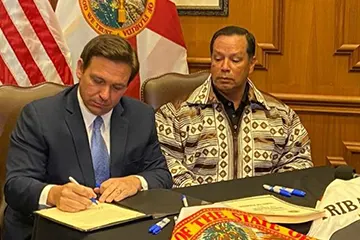 On Friday last week, a three-judge panel of the U.S. Circuit Court of Appeals for the District of Columbia unanimously agreed to overturn a ruling from November 2021 taken by a federal judge, which struck the gaming compact between the Seminoles and the Sunshine State. This is a big win for the tribe because it will allow the Seminoles to relaunch its online sports betting operations through its Hard Rock Sportsbook app.
On Friday last week, a three-judge panel of the U.S. Circuit Court of Appeals for the District of Columbia unanimously agreed to overturn a ruling from November 2021 taken by a federal judge, which struck the gaming compact between the Seminoles and the Sunshine State. This is a big win for the tribe because it will allow the Seminoles to relaunch its online sports betting operations through its Hard Rock Sportsbook app.
In November 2021, Governor Ron DeSantis and the Seminole tribe signed a 30-year gaming compact, approved by the House and the Senate. Under the gaming compact, the Seminoles were given exclusive rights to conduct online sports betting. To avoid amending the constitution, the gaming compact allowed the tribe to use the so-called “hub-and-spoke” system, according to which sports wagers could be placed from anywhere in the state on condition the bet is processed on servers located in Seminole land.
The gaming compact prompted two Florida operators to file a lawsuit against the deal, claiming it violated federal laws. Only three weeks later, U.S. District Judge Dabney Friedrich struck the deal, explaining that it was improperly approved. She said that the agreement, indeed, violated federal laws because it would allow the tribe to offer gambling services outside its land. Friedrich added that this would have a negative effect on pari-mutuel operations.
The U.S. District Judge also overturned other parts of the compact and found that U.S. Interior Secretary Deb Haaland made a mistake by approving the deal, which became effective in the summer of 2021. The authority responsible for supervising tribal gambling is the Department of the Interior.
Why the Court Reversed the November 2021 Decision?
But on Friday last week, the U.S. Circuit Court of Appeals for the District of Columbia sided with the department and overturned Friedrich’s decision. In a 24-page opinion written by Judge Robert Wilkins and supported by Judges Karen Henderson and J. Michelle Childs, it was explained that Friedrich mistakenly threw out the sports betting compact, also known as IGRA.
Wilkins wrote that a gambling compact can allow a tribe to offer gambling services on its land. But a gaming compact is an agreement between the tribe and the state, and thus, it does not prohibit the two parties from negotiating other issues, such as activities outside reservation boundaries.
Wilkins, however, noted that state courts must decide whether or not Florida’s residents can place a bet outside Indian lands and if the Seminoles’ gaming compact with the state violates a Florida constitutional amendment from 2018, also known as Amendment 3. Under this amendment, proposed gambling expansions in Florida must be approved by voters. The appellate panel also noted that the ruling upholds Haaland’s decision to allow the gaming compact to become effective and that the deal is not against federal laws.
When the Seminoles are Expected to Relaunch Sports Betting Operations?
A spokesperson for Gov. Ron DeSantis said that the state would continue working with the tribe in order to ensure the success of the agreement, which would generate nearly $20 billion in revenues. In a statement issued on Friday, the Seminoles said that they were satisfied with the court’s decision, which would benefit not only the tribe but also the state and its residents. However, it did not become clear whether the tribe would relaunch its sports betting app immediately and if the pari-mutuel businesses would bring the case to the full appellate court or the U.S. Supreme Court.
Under the gaming compact signed in 2021, the Seminole Tribe would have exclusive rights over the sports betting market in the state. Besides, it would allow the tribe to establish three casinos on Indian land in Broward County and offer craps and roulette at its gambling venues. In return, the tribe would pay the state at least $2.5 billion over the first five years of the compact and billions of dollars throughout the rest of the 30-year period.
Hamish Hume, an attorney representing the pari-mutuels, said that the court rightfully ruled that the gaming compact did not allow the tribe to offer gambling outside Indian land but still ruled in favor of the tribe. In an email, Hume said that the pari-mutuel businesses in the state would examine their options and determine what further steps they could take.
The ruling was heavily criticized by some attorneys, who explained that IGRA violated the 2018 amendment. Daniel Wallach, an attorney who specializes in gambling law, called the ruling “an outlier” and said that it would catch the attention of the U.S. Supreme Court.